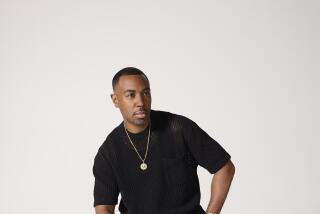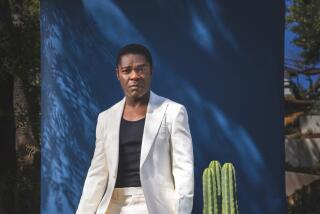Let the Avengers save the world, Cress Williams is happy for Black Lightning to save his neighborhood
Cress Williams plays two neighborhood heroes in the CW series “Black Lightning.” By night, he’s Freeland’s fluorescing superhero who teaches deadly drug dealers and corrupt law enforcement lessons via high voltage. By day, he’s high school Principal Jefferson Pierce, a suit- and tie-wearing pillar of the community who arms the next generation with the greatest defense of all: an education.
“A lot of superhero fare that’s out there is a mega, save-the-world type of thing,” Williams said on a recent stop by The Times’ video stage. “We’re rooted in a neighborhood and in the community. Jefferson, a.k.a. Black Lightning, has tried education as a means to positively affect the community, then realizes sometimes you’ve got to mess stuff up as well. It’s great because [the show] is rooted in real life and real issues… It’s a family drama with superpowers sprinkled on top and social commentary rolled into one.”
“Black Lightning,” which is based on a DC Comic that originated in the late ’70s, is a superhero for our time. He tackles issues facing the African American community in the fictional city of Freeland as well as the challenges of holding a marriage together while raising kids and working two jobs.
WATCH: Video Q&A’s from this season’s hottest contenders »
But the beauty of this family is that despite marital problems, teen rebellion and external pressures, Pierce’s powered daughters Lightning (China Anne McClain) and Thunder (Nefessa Williams) and neuroscientist spouse Lynn (Christine Adams) eventually join him in the crusade to make the city safe again.
And there’s plenty of work to be done. The city is rife with crime and corrupt law enforcement. Cress Williams said the sci-fi or superhero genre can sometimes make “it easier to look at truth in a [fantasy context because] you see it from a safe distance. Even though it’s a fictional city, it’s kind of representative of so many cities across America that seem forgotten, that seem lost…”
The series, which recently wrapped up its first season, premiered in January a month before “Black Panther” hit theaters and ended about six weeks before the planned return of “Luke Cage” to Netflix.
“It was amazing watching the show live, then seeing a commercial for ‘Black Panther’; then on Twitter someone’s like, ‘Omg! I’m watching “Black Lightning” and I just saw a commercial for “Black Panther.” It’s a great day to be alive!’ ” said Williams of the three productions, which feature largely black superheroes and casts. “It’s epic. I’m curious to see 10 years down the line what effect it’s had.”
“Historically, African American content has been few and far between, so when ground is broken, it’s like this show has to be everything!,” said Williams. “It has to tell everything. But to have a ‘Luke Cage,’ and to have ‘Black Panther’ and ‘Black Lightning’ — with our show we’re allowed to be who we are and just tell that story and trust that other stories are being told elsewhere. It’s pretty cool. We get to stay concentrated on a neighborhood, on a family and on what’s going on in society and how it’s affecting that neighborhood. We’re not fighting aliens. At least I hope we don’t fight them soon.”
Wait, does that mean he will at some point be fighting otherworldly villains in Season 2?
“No, that would be the proverbial ‘jumped the shark’ moment,” he laughed. “There’s enough to fight in just the world we live in.”
To watch the entire interview, click on the video below.
More to Read
From the Oscars to the Emmys.
Get the Envelope newsletter for exclusive awards season coverage, behind-the-scenes stories from the Envelope podcast and columnist Glenn Whipp’s must-read analysis.
You may occasionally receive promotional content from the Los Angeles Times.








